The mission of the Institute for Child and Family Well-Being is to improve the lives of children and families with complex challenges by implementing effective programs, conducting cutting-edge research, engaging communities, and promoting systems change.
The Institute for Child and Family Well-Being is a collaboration between Children’s Wisconsin and the Helen Bader School of Social Welfare at the University of Wisconsin-Milwaukee. The shared values and strengths of this academic-community partnership are reflected in the Institute’s three core service areas: Program Design and Implementation, Research and Evaluation, and Community Engagement and Systems Change.
In This Issue:
- Meet the ICFW
- Program Design and Implementation
- Research and Evaluation
- Community Engagement and Systems Change
- Recent and Upcoming Events
Meet the ICFW
Join us as we celebrate our MSW interns. The ICFW team would like to say thank you and congratulations to our most recent interns!
During their time with us, each one demonstrated an ability to think critically, a wealth of mental agility when tasked with new challenges and a true passion for the work and the families we serve. Their unique skill sets and experiences were integral to the advancement of our Strong Families, Thriving Children, Connected Communities (SFTCCC) initiative.
We wish each of them much success in their future endeavors!
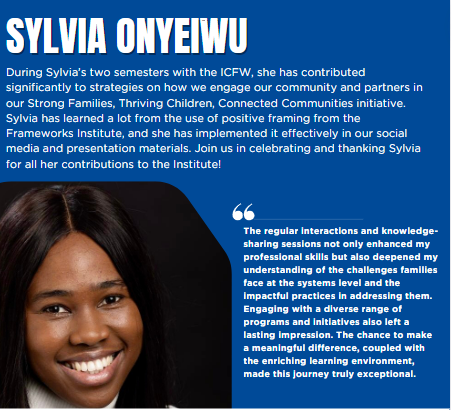
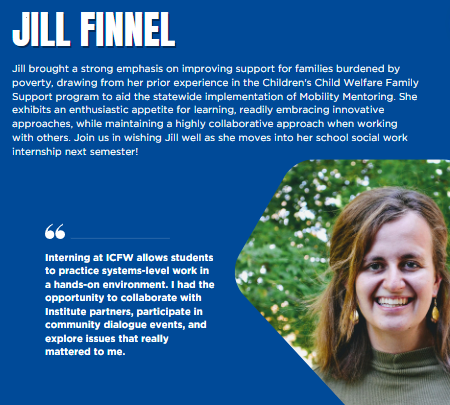
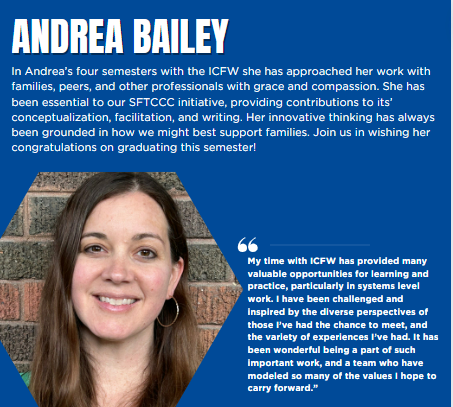
If you are interested in joining our team as a Master’s-level intern with a focus on systems, please contact Luke Waldo at lwaldo@childrenswi.org.
Program Design and Implementation
The Institute develops, implements and disseminates validated prevention and intervention strategies that are accessible in real-world settings.
Translational Design Workshop
Do you have a longstanding problem facing the families in your community?
We all know that accomplishing a positive shift in mindsets is both lofty and daunting, but essential to everlasting policy and systems change. If your organization is seeking innovative ways to influence the narrative surrounding child welfare, poverty or other systemic issues in your community, this workshop is for you!
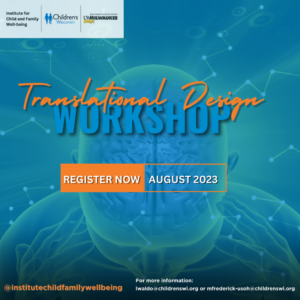
The Translational Design workshop is a six-week training course that is structured to meet the needs of busy schedules. At your own pace, you will complete weekly on-line activities and exercises that are focused on creating tangible opportunities for knowledge application. Each weekly session will be supplemented with instructor-led practice sessions, where you can ask questions and build a Community of Practice with your peers.
Translational Design is a process that draws on different disciplines, from Human Centered Design, Common Elements Approach, and Implementation Science into a three-phase process.
Learning Objectives:
- Brainstorm and design solutions to longstanding challenges
- Engage content and context experts in the design and improvement processes
- Build a Community of Practice which can serve as a learning collaborative and supportive capacity-builder
- Identify and frame the challenges concerning complex issues that have been standing in the way of program- and client- level success
- Move your program or current research more quickly into practice
Join us as we create meaningful prototypes and tangible solutions.
Registration fee: $400 for a team of up to four people. Scholarships available.
Register here to begin your innovation journey!
Building Brains with Relationships at Sojourner Family Peace Center
Building Brains with Relationships (BBR) is a one-day workshop with continued skill building in an optional virtual Community of Practice. The power of social connection is explored through the lens of trauma, economic supports and interpersonal relationships. Sojourner Family Peace Center, Wisconsin Child Welfare Professional Development System and Wisconsin Association of Family and Children’s Agencies (WAFCA) have hosted several workshops in 2023.
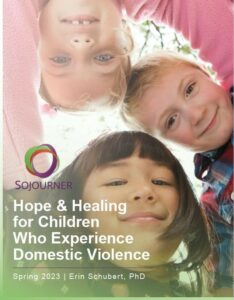
Sojourner Family Peace Center is currently partnering with our team as part of their “Hope & Healing for Children Who Experience Family Violence” initiative, funded by the Department of Health & Human Services – Substance Abuse & Mental Health Services Administration. The initiative seeks to “increase capacity at the Family Peace Center to provide evidence-informed services to children who have experienced family violence thereby improving their wellbeing including increased safety, decreased PTSD, improved behavior, and increased hope.” Building Brains with Relationships has been delivered to over 40 staff members from executive and program leadership to group facilitators and shelter and legal advocates. Our collaboration strives to build capacity so that Sojourner can expand its “Child Witness to Domestic Violence” and “Moms & Teens for Safe Dates” program.
Participants:
- Build a shared understanding of the power of relationships and connection on brain architecture by playing the Brain Architecture Game;
- Add to their protective factors, sometimes called strengths, by practicing skills that are shown to strengthen relationships, create partnerships and increase desired outcomes.
Although the topics are serious, it’s a high value experience. The dozens of participants in 2023 have had time to practice divergent and convergent thinking, communication skills, coping skills and systems design ideation. Participants have ranged from juvenile justice workers, to parents, teachers, domestic violence advocates and home visiting parenting aids. People within the same organization have used this time to think, talk and design around community issues in ways that they’re everyday-work does not allow. They can then continue conversations and relationships in the virtual Community of Practice offered monthly.
The last two in-person sessions in 2023 are October 2nd in Eau Claire, WI (visit WAFCA.org to register) or November 15th in Glendale, WI (create an account here and after that, email wcwpds-mke@uwm.edu to reserve your seat for the 11/15 event).
Research and Evaluation
The Institute accelerates the process of translating knowledge into direct practices, programs and policies that promote health and well-being, and provides analytic, data management and grant-writing support.
Recent ICFW Publications
T-SBIRT: Improving the lives of those exposed to serious trauma
The work of Dimitri Topitzes, ICFW Director of Clinical Services, on T-SBIRT (trauma, screening, brief intervention, and referral to treatment) was highlighted in Research Features in May 2023. “T-SBIRT can help individuals exposed to traumatic events and situations by reducing their distress, making them aware of their experiences and reactions, providing them with support, and – if required – referring them for treatment. As Topitzes explains, ‘T-SBIRT has two main aims, to help individuals gain insight into the extent and effects of their trauma exposure, and to enhance their motivation to engage in positive coping, such as seeking behavioural or mental health services.’”
Intergenerational Trauma
Two new ICFW papers uncover the intergenerational consequences of trauma.
ICFW predoctoral fellow, Anthony Gómez, headed a study that called attention to the lasting effects of maternal incarceration on children’s social and emotional development.
Gómez, A. Mersky, J. P., Plummer Lee, C., Zhang, L., Shlafer, R. J., & Jackson, D. B. (2023): The long arm of maternal incarceration. Child and Adolescent Social Work Journal.
Dr. Colleen Janczewski, ICFW policy and practice analyst, showed that childhood adversity predicts adult experiences of domestic violence and involvement in the child welfare system.
Janczewski, C. E., Mersky, J. P., & Lee, C. P. (2023). Intergenerational transmission of child protective services involvement. Child Abuse & Neglect.
Community Engagement & Systems Change
The Institute develops community-university partnerships to promote systems change that increases the accessibility of evidence-based and evidence-informed practices.
Strong Families, Thriving Children, Connected Communities Initiative – Introducing the Critical Pathways
By Luke Waldo
Children thrive when they have regular interactions with responsive, caring adults. Families experiencing significant stressors related to financial insecurity, housing instability, or the impact of systemic racism and interpersonal trauma can be overloaded with stress, interrupting those interactions. In the United States 1 in 3 of all children will experience a Child Protective Services (CPS) investigation, 1 in 10 will have confirmed or substantiated instances of maltreatment, and in Wisconsin 70% of all children in foster care were separated from their families with neglect cited as a removal reason.
We believe that neglect is preventable. The goal of the Strong Families, Thriving Children, Connected Communities (SFTCCC) initiative is to prevent family separation due to neglect by establishing a network of changemakers aligned on core, collaboratively developed, critical pathways. The SFTCCC strategy aims to empower potential by coordinating efforts, elevating local initiatives, inspiring new ideas, and catalyzing policy and systems change through collective action. It promotes learning for effective problem-solving, supports co-created solutions, connects networks, and highlights local innovations. Through innovation and collaboration, this initiative aims to work across systems, bridge silos, and engage diverse changemakers through four phases, which can include concurrent activities.

Building a Shared Understanding of Neglect
In the first phase, Building a Shared Understanding, the Children’s Wisconsin ICFW team hosted roundtables, a data walk, storytelling cafes, and produced the Overloaded: Understanding Neglect podcast to explore the root causes of neglect. We’ve relied on valuable input from SFTCCC participants through roundtable discussions, a data walk, and other targeted feedback opportunities. Through this process, we were able to align the insights and experiences of those who know the issues best with the evidence that has shown promise in advancing meaningful solutions. This collaborative effort identified four critical pathways that will shape the future of SFTCCC activities.
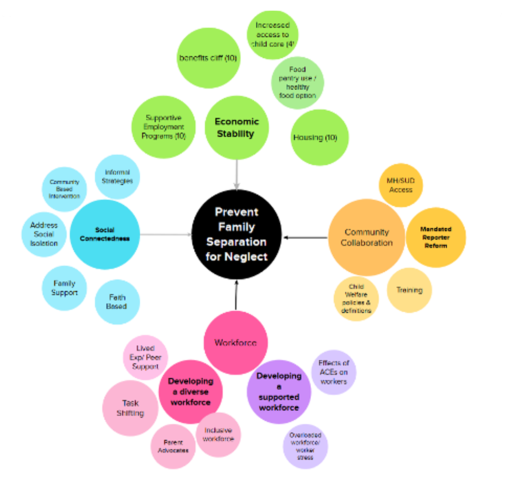
Critical Pathways are specific problem/priority spaces that are focal points for elevating or designing specific and actionable system-level solutions. Through a series of seven roundtables, four Conversation Cafes, and a Data Walk during the past year, we’ve worked with staff at Children’s Wisconsin, community organizations, and people with lived experience to identify systemic challenges, risk factors, and barriers to supporting families overloaded by stress. We have analyzed the data that we have collected through these community events along with the emerging research in the field to develop our four Critical Pathways.
Even if you haven’t been to any SFTCCC events before, now is a great time to get involved as we begin the collaborative journey on our Critical Pathways to identify and design system-level solutions that will support overloaded families and keep them together. By joining the Critical Pathways journey, you will:
- Build relationships with key stakeholders – organizational and community leaders and staff, people with lived experience – from around the state to better understand these complex issues, surface priorities, and guide solution design;
- Gain broader access to tools, workshops, webinars, and events;
- Discover and share ideas with the many local initiatives across the state;
- Identify levers and advocate for policy and systems change.
If you are interested in learning more and/or joining this initiative, please visit the SFTCCC project page or sign up here.
If you would like to attend an upcoming Critical Pathways Virtual Convening, please register here:
Economic Stability: September 13th from 10:00-11:00am
Community Collaboration: September 20th from 11:30-12:30pm
Workforce Inclusion and Innovation: October 4th from 1:00-2:00pm
Social Connectedness: October 10th from 1:00-2:00
Where is Strong Families, Thriving Children, Connected Communities Going Next?
Understanding the type of challenges we are facing is critical for effective and efficient change efforts. Simple problems, for example, are like baking bread. Even if someone hasn’t done it before, it’s been repeated throughout history. Complicated challenges take specific technical or training expertise, but are repeatable, like going to the moon. While significant resources, time, and expertise on a variety of levels were needed, it was repeated several times. Complex challenges are like raising kids. The same approach may not work for two kids, even siblings, regardless of how similar the conditions might be.
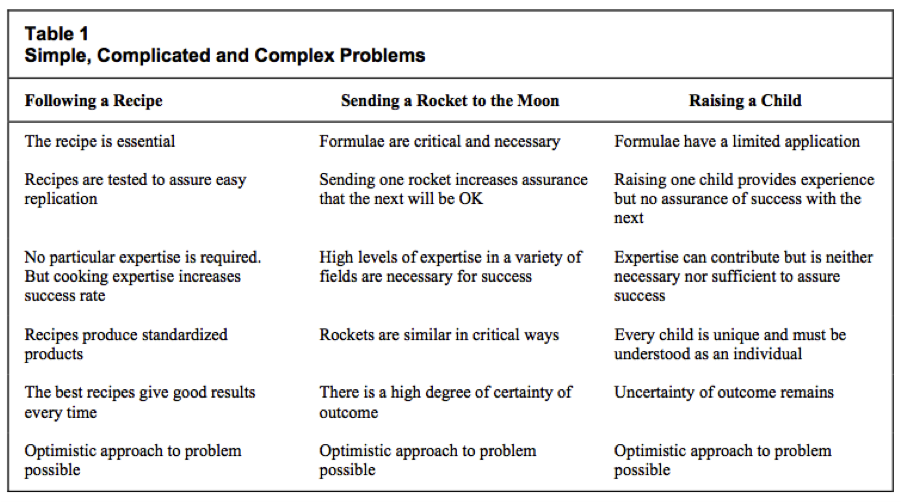
Neglect is a complex challenge with several dynamic contributing factors, which can diffuse prevention efforts. The SFTCCC community worked over the past year to build a shared understanding about neglect and identify priority issues within neglect prevention through sharing stories, harvesting lessons learned, and exploring research and data. Through this process we identified four critical pathways to prioritize our work: Economic Stability, Community Collaboration, Social Connectedness, and Workforce Inclusion and Innovation.
While learning will be ongoing, and new participants will always be welcomed, SFTCCC is building towards trying to make sense of what’s going on in the system now. Our next step will be focused on understanding the current efforts or challenges surrounding the four critical pathways. This means exploring current trends, identifying innovative practices and policies within and outside of the SFTCCC community, and challenging assumptions about the current context and a potential future state.
We aren’t attempting to create a comprehensive model of all the occurrences within and surrounding the system, as this would be an unfeasible task. Instead, the goal is to organize and deepen the dialogue within your team about current events, extending beyond mere observations of patterns and events to include theories about underlying structural elements. The more adept you become at viewing systems from a structural standpoint, the more empowered you are to understand and influence those systems.
Our endeavor is to forge consensus about what’s certain and uncertain by employing disciplined, transparent observation of the existing state, coupled with methodical and patient probing of the fundamental systemic structures. The emphasis will remain on potential developments rather than on preferred outcomes.
Following this, we will create a set of meaningful scenarios reflecting possible developments within the system. To serve their purpose, these scenarios must be pertinent, thought-provoking, feasible, and unambiguous. We will then explore the implications and conclusions that can be drawn from these scenarios, focusing on what actions are viable and necessary, what goals can be pursued, and who might be the partners in achieving those objectives.
Join us at an upcoming Critical Pathways Virtual Convening, please register here:
Economic Stability: September 13th from 10:00-11:00am
Community Collaboration: September 20th from 11:30-12:30pm
Workforce Inclusion and Innovation: October 4th from 1:00-2:00pm
Social Connectedness: October 10th from 1:00-2:00
The Epidemic of Isolation in America: Weaving a Tapestry of Social Connection in Wisconsin
When I first arrived in America, I was astounded by Atlanta International Airport’s massive size and buzzing life. People walked quickly and conversed on the move. It was a stark contrast to my homeland, Nigeria, where spontaneous interactions may keep people set in one spot for an extended amount of time, and a simple “Hello” can lead to valuable connections. People seek refuge within themselves in the face of financial uncertainty, poor governance, restricted access to resources, and a lack of quality education. Individuals voluntarily offer childcare, food, and emotional support without a price tag, creating a unique spirit of communal living. Nigerians, as we say, “turn up” for one another. Survival instincts refined by adversity, an impermeable network of solidarity, and strong social interactions are key pillars that define our resilience.
As I embarked on my American study experience, the predominant perception I carried from home was of an isolated American culture – a culture that seemed to suggest “Rely on yourself, enjoy your own company.” This perspective was swiftly shattered when I felt the warm embrace of my course adviser, Dr. Linda Britz, who not only welcomed me at the Milwaukee airport when I first arrived in Wisconsin, but also helped me through my first days in a new land. This was an unanticipated America; one that replaced prejudices with genuine compassion and personal connections.
As I learned more about Wisconsin and its people, I observed the deliberate infrastructures woven into this community for forging meaningful bonds. A simple act such as my friend, Liz, encouraging me to use the public library, spoke volumes. In Nigeria, the dream to access a nearby public library was a distant one. The nearest library is twenty miles away from my Lagos home. Not to mention the logistics and financial barriers involved in accessing this resource. The library closest to where I live in Milwaukee is roughly a twenty-minute walk away. The clear difference highlights the importance of easily accessible resources, in building connections and living a healthy life. On my first visit, Ms. Jennifer, the lovely security lady at the Milwaukee Public Library on Mitchell Street, greeted me with a warm smile. She’d then ask how I was doing and what I was learning in school. She encouraged my choice of the Social Work profession and shared that her daughter was studying to be a teacher. This discussion was around fifteen minutes long, but it served as a reminder to stay on course and work towards my goals. One time, I didn’t visit the library as often as I usually would. Ms. Jennifer noticed my absence and inquired about about my well-being the next time she saw me. Her “Hello” left a memorable impression on me.
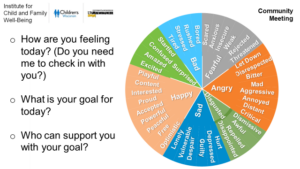
The key to developing connections with others is in the little details. Community Meetings are my favorite at the Institute. Before the meeting begins, we take turns checking in with each other, describing our current mood, aligning our tasks, and requesting help as needed. This practise has made me more comfortable asking for and receiving support. I, too, am aware of the stigma associated with seeking assistance. Even if our “Hello” goes beyond civility and acts as an open invitation to tell someone you trust how you genuinely feel, asking for and accepting help can be daunting in Nigeria. Stigma, anxiety, and uncertainty are frequently unseen barriers that keep people from seeking support, perpetuating isolation even in times of need. ‘Would they understand me?’, ‘Would they be able to provide this assistance?’, ‘What if I get into more trouble?’, ‘What if they mock me?’, ‘What if I lose my job or family?’ are all valid concerns. As professionals, using lived experiences to create and cultivate safe environments in which vulnerability is seen as strength rather than weakness, aids in removing the stigma associated with getting help.
My passion for social justice derives from the realization that long-term change requires systems change. This was my motivation for pursuing my internship at the Institute, and my supervisor, Luke Waldo, enabled me to succeed. While the pandemic led to a significant transition from in-person to virtual work spaces, Luke made efforts to meet with me in person for supervisions. During our sessions, we went to various coffee and tea shops. These meetings gave me the opportunity to share my lived experiences while also learning from Luke’s. We bonded over coffee, stories from our travels, and our mutual appreciation for Senator Elizabeth Warren.
Policy is personal. I quickly resonated with this statement put forward by Elizabeth Warren when I got involved in the SFTCCC initiative. During the data collection phase of this project, I was drawn to the Critical Pathways of social connectedness and community collaboration. Reflecting on both Critical Pathways brought back memories of my own arrival in America, and comparing the support I received to the possible isolation that could have awaited me, it is beyond doubt that meaningful connections can improve lives and help people thrive. The accumulation of all the support I’ve received fuels my commitment to provide the same intentional care to others, and pave their paths with the same compassion and understanding.
My resilience in adapting to my new surroundings is sustained by my in-person environment, not by the country I was born in. I am thriving in America because a group of people, as well as a loving community, Milwaukee, have provided me with the guidance I have needed each step of the way. I am thriving because I did not rely solely on myself and my personal space. Rather, I am connected with those who have embraced me and given me a voice. My academic ambitions are supported by my faculty and instructors at the Helen Bader School of Social Welfare. Liz, Janet, Jill, and Andrea have been extremely responsive in ensuring I have what I need to succeed both academically and socially. This is the Wisconsin I have come to know and love. This is how I made it through despite the difficulties of adjusting to my new environment.
Children, too, are learning to adapt to their surroundings. A strong network of caring adults who purposefully provide support to adolescents as they navigate life, results in positive outcomes. Caregivers who are overloaded with stress are adversely impacted by social inequities and financial insecurity, making it far more difficult to provide the much needed resources for children. Human service organisations and professionals are working around the clock to assist overloaded families. However, they are frequently met with burnout and restricted access to resources, when providing this assistance.
As Helen Keller appropriately puts it, “Alone we can do so little, together we can do so much.” The approach to reducing social isolation does not lie in working in silos. We can collectively come together to take a single action while also tending to our corners. Sharing knowledge and lived experiences, as well as leveraging existing resources to foster a culture of togetherness and community engagement is a bold step towards propelling systems change, and developing a workforce that better serves our communities. At our SFTCCC introduction event, it was interesting to learn about the unconventional ways that other organisations are utilising to address social isolation in their communities. One of such is using libraries to establish meaningful interactions between families and their children.
It’s been a year since I have lived in Milwaukee, and I can only imagine how different my experience would have been if I had lived in isolation and had to navigate being in America alone. Children require this support, and more to succeed. My professional goals are closely aligned with the Institute’s mission. I, too, am keen on driving systems change that strengthens family preservation and well-being. For me, this is personal.
ICFW Podcast Headlining National Convening
By Luke Waldo
On September 28th & 29th, the Children’s Home Society of America (CHSA) will partner with the Jordan Institute for Families and the Children’s Home Society of North Carolina to host the 11th Annual Wicked Problems of Child Welfare Convening. The event will be held in-person at The Duke Endowment: The Mary Duke Biddle Trent Semans Conference Center in Charlotte, North Carolina.
The theme for this 11th annual Institute is: Prevention in Action: Building Equitable Pathways to Child and Family Well-Being. CHSA members and invited experts from across the country will collaborate to build shared understanding of systemic factors that can overload families, such as generational trauma, poverty, and structural inequities and gaps caused by historical and current realities. A generative working session, the Institute will focus on actionable, implementable solutions.
The Convening will be using the Overloaded: Understanding Neglect podcast as source material for the working sessions, and will be opening its first day with a panel discussion with podcast host Luke Waldo and podcast participants Jennifer Jones, Bryan Samuels, and Bregetta Wilson.
Recent and Upcoming Events
The Institute provides training, consultation and technical assistance to help human service agencies implement and replicate best practices. If you are interested in training or technical assistance, please complete our speaker request form.
- Translational Design Workshop – Begins October 5th
- Wicked Problems of Child Welfare Convening – September 27th-29th
- SFTCCC Critical Pathways Convenings
- Economic Stability: September 13th from 10:00-11:00am
- Community Collaboration: September 20th from 11:30-12:30pm
- Workforce Inclusion and Innovation: October 4th from 1:00-2:00pm
- Social Connectedness: October 10th from 1:00-2:00
- Building Brains with Relationships Workshops with WAFCA – October 2nd
- Overloaded: Understanding Neglect Season 2 – Fall 2023 Release

